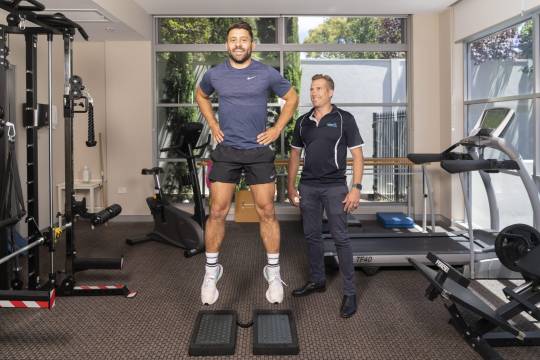Text
Why Choose Physiotherapy for Pain Relief and Rehabilitation?
Physiotherapy stands as a beacon of hope for individuals seeking effective pain relief and rehabilitation solutions. With a plethora of services tailored to address a wide range of conditions, physiotherapists offer expertise, compassion, and personalized care to guide patients on their journey to recovery and improved well-being. This article delves into the compelling reasons why choosing physiotherapy is a wise decision for pain relief and rehabilitation needs.

Comprehensive Pain Management Strategies
Physiotherapy adopts a holistic approach to pain management, addressing not only the symptoms but also the underlying causes of pain. Whether it's chronic back pain, sports injuries, or musculoskeletal conditions like knee osteoarthritis, physiotherapists employ evidence-based techniques such as manual therapy, exercise therapy, and modalities like massage and dry needling to alleviate pain and promote healing.
Personalized Rehabilitation Programs
One of the key advantages of choosing physiotherapy is the personalized approach to rehabilitation. Physiotherapists conduct thorough assessments to understand each patient's unique needs, goals, and challenges. Based on this assessment, they develop tailored rehabilitation programs that address specific functional deficits, restore mobility, and optimize overall function.
Expertise in Sports Injury Rehabilitation
An active sports community benefits greatly from specialized sports physiotherapy services. Physiotherapists possess extensive expertise in sports injury management, offering targeted interventions to facilitate recovery and return to sport. From acute sports injuries to chronic overuse conditions, physiotherapy plays a crucial role in restoring athletes' performance and preventing future injuries.
Access to Advanced Modalities and Techniques
Physiotherapy encompasses a wide array of modalities and techniques aimed at enhancing recovery outcomes. From acupuncture and shockwave therapy to clinical pilates and hydrotherapy, physiotherapists leverage advanced treatment modalities to address diverse patient needs and preferences. These modalities complement traditional physiotherapy approaches, providing patients with comprehensive and effective rehabilitation options.
Emphasis on Education and Empowerment
In addition to hands-on treatment, physiotherapy emphasizes patient education and empowerment. Physiotherapists educate patients about their condition, teaching self-management strategies, injury prevention techniques, and exercises for ongoing maintenance and improvement. By empowering patients to take an active role in their recovery, physiotherapy fosters long-term health and well-being.
Multidisciplinary Collaboration for Optimal Care
Physiotherapy often involves collaboration with other healthcare professionals to ensure comprehensive and integrated care. Physiotherapists work closely with physicians, surgeons, chiropractors, and other allied health professionals to develop cohesive treatment plans that address all aspects of the patient's health and well-being. This multidisciplinary approach enhances treatment efficacy and patient outcomes.
In conclusion, physiotherapy offers a wealth of benefits for individuals seeking effective pain relief and rehabilitation solutions. With personalized care, expertise in sports injury rehabilitation, access to advanced modalities, and a focus on education and empowerment, physiotherapists are dedicated to helping patients achieve their health and wellness goals. Whether you're recovering from an injury, managing chronic pain, or seeking to optimize your performance, physiotherapy provides the expertise and support you need to thrive.
0 notes
Text
Your Complete Guide to Physiotherapy: Services, Benefits, and FAQs
Physiotherapy serves as a cornerstone of healthcare, offering a wide range of services tailored to individuals' needs. Whether you're recovering from a sports injury, managing chronic pain, or seeking rehabilitation after surgery, physiotherapists are equipped with the expertise to assist you on your journey to recovery and improved well-being. This comprehensive guide explores the services, benefits, and frequently asked questions surrounding physiotherapy.

Services Offered
1. Rehabilitation and Injury Management
Physiotherapists specialize in rehabilitating various injuries, including sports injuries, musculoskeletal conditions, and post-surgical rehabilitation. Through personalized treatment plans encompassing exercise therapy, manual techniques, and modalities like massage and dry needling, they aim to restore optimal function and mobility.
2. Pain Management and Relief
Chronic pain can significantly impact one's quality of life. Physiotherapy offers effective pain management strategies tailored to individual needs. Techniques such as acupuncture, electrotherapy, and therapeutic exercise programs are utilized to alleviate pain and improve overall well-being.
3. Sports Physiotherapy
An active sports community benefits from specialized sports physiotherapy services. Physiotherapists provide injury prevention strategies, performance enhancement programs, and rehabilitation for sports-related injuries, ensuring athletes can return to their sport safely and swiftly.
4. Clinical Pilates
Clinical pilates is a popular service offered by physiotherapists. It focuses on core stability, flexibility, and posture correction to address musculoskeletal issues and enhance overall body awareness and control. Tailored programs cater to individuals' specific needs and fitness levels.
5. Women's Health Physiotherapy
Physiotherapists also offer specialized care for women's health issues such as pelvic floor dysfunction, prenatal and postnatal musculoskeletal conditions, and continence management. Through pelvic floor exercises, manual therapy, and education, they assist women in optimizing their pelvic health.
Benefits of Physiotherapy
1. Personalized Care
Physiotherapy emphasizes personalized care, with treatment plans tailored to individual needs, goals, and conditions. This patient-centered approach ensures optimal outcomes and satisfaction.
2. Holistic Approach
Physiotherapists adopt a holistic approach to health and well-being, addressing not only the physical aspects but also the psychological and social factors influencing recovery and rehabilitation.
3. Pain Relief and Management
Physiotherapy offers effective pain relief and management strategies, reducing reliance on medication and promoting natural healing processes. Patients experience improved comfort and functionality as they progress through treatment.
4. Improved Mobility and Functionality
Physiotherapy interventions focus on improving mobility, flexibility, and strength, enhancing overall functionality and independence in daily activities and sports performance.
5. Education and Empowerment
Physiotherapists empower patients through education, teaching self-management techniques and strategies to prevent future injuries and promote long-term health and well-being.
FAQs about Physiotherapy
Q: Do I need a referral to see a physiotherapist?
A: In most cases, a referral is not required to see a physiotherapist. However, some healthcare plans or insurance providers may have specific requirements, so it's best to check with your provider beforehand.
Q: How many sessions of physiotherapy will I need?
A: The number of physiotherapy sessions required varies depending on the individual's condition, severity of injury, and treatment goals. Your physiotherapist will assess your needs and recommend a personalized treatment plan, which may include a specific number of sessions.
Q: Is physiotherapy covered by health insurance?
A: Many health insurance plans cover physiotherapy services. It's advisable to check with your insurance provider regarding coverage details, limits, and any out-of-pocket expenses.
Q: What should I expect during my first physiotherapy appointment?
A: During your initial appointment, your physiotherapist will conduct a thorough assessment of your condition, medical history, and treatment goals. They will then develop a personalized treatment plan tailored to your needs, which may include a combination of hands-on therapy, exercises, and modalities.
Q: How long does a physiotherapy session typically last?
A: Physiotherapy sessions typically last between 30 to 60 minutes, depending on the individual's needs and treatment plan. Your physiotherapist will discuss session duration and frequency with you as part of your treatment plan.
In conclusion, physiotherapy offers a comprehensive range of services aimed at promoting recovery, pain relief, and improved quality of life. With personalized care, evidence-based interventions, and a focus on holistic well-being, physiotherapists are dedicated to helping individuals achieve their health and rehabilitation goals. Whether you're recovering from an injury, managing chronic pain, or seeking to optimize your physical performance, physiotherapy is a valuable resource for your health and well-being.
0 notes
Text
Comprehensive Overview: Common Conditions Treated by Physiotherapists
Physiotherapy, a cornerstone of modern healthcare, plays a pivotal role in alleviating pain, promoting mobility, and enhancing overall well-being. Physiotherapists are highly trained professionals who cater to a diverse range of conditions, offering specialized treatments tailored to individual needs. From sports injuries to chronic pain management, physiotherapy services encompass a broad spectrum of expertise. Let's delve into the common conditions treated by physiotherapists, offering a comprehensive overview of their services and approaches.

Sports Injuries and Rehabilitation
A community's vibrant sports culture often leads to various sports-related injuries, ranging from sprains and strains to more complex musculoskeletal issues. Physiotherapists specializing in sports physiotherapy employ a multidisciplinary approach to assess and treat such injuries. Through personalized exercise therapy, tailored rehabilitation programs, and modalities like massage and dry needling, they aid athletes and sports enthusiasts in their recovery journey.
Pain Management and Relief
Chronic pain can significantly impact one's quality of life, hindering daily activities and overall well-being. Physiotherapists employ evidence-based techniques to manage and alleviate pain effectively. From manual therapy and acupuncture to exercise prescription and electrotherapy modalities, they craft holistic treatment plans to address the underlying causes of pain and enhance functional outcomes.
Musculoskeletal Conditions
Conditions like knee osteoarthritis, shoulder impingement, and bursitis are commonly treated by physiotherapists. Utilizing a combination of hands-on therapy, exercise interventions, and education, they aim to improve joint function, reduce stiffness, and enhance mobility. Whether it's through clinical pilates, hydrotherapy, or tailored exercise programs, physiotherapists play a pivotal role in managing musculoskeletal ailments.
Neurological Rehabilitation
Physiotherapy plays a crucial role in neurological rehabilitation, aiding individuals recovering from strokes, spinal cord injuries, or neurological disorders. Physiotherapists specialize in neuro-rehabilitation, offering targeted interventions to improve motor function, balance, and coordination. Through task-specific training, gait re-education, and neurophysiological techniques, they facilitate recovery and optimize independence for their patients.
Cardiac Rehabilitation
Cardiac rehabilitation is another area where physiotherapists excel. Following cardiac events or surgeries, patients benefit from tailored exercise programs, risk factor management, and lifestyle modifications under the guidance of qualified physiotherapists. By promoting cardiovascular fitness and addressing cardiac risk factors, physiotherapy plays a vital role in cardiac rehabilitation and secondary prevention.
Women's Health
Physiotherapists also provide specialized care for women's health issues such as pelvic floor dysfunction, prenatal and postnatal musculoskeletal conditions, and continence management. Through pelvic floor exercises, manual therapy, and education, they assist women in optimizing their pelvic health and overall well-being throughout various life stages.
Aged Care and Disability Services
For individuals in aged care or those living with disabilities, physiotherapy services cater to unique needs and challenges. Physiotherapists collaborate with multidisciplinary teams to enhance mobility, prevent falls, and improve overall function and independence. Through tailored exercise programs, mobility aids prescription, and environmental modifications, they promote optimal aging and quality of life for their clients.
In conclusion, physiotherapists offer a comprehensive range of services to address various conditions and promote optimal health and well-being. Through evidence-based practice, personalized care, and a multidisciplinary approach, they play a vital role in enhancing the lives of their patients across the lifespan. Whether it's through sports injury rehabilitation, pain management, neurological rehabilitation, or specialized women's health services, physiotherapy remains a cornerstone of healthcare, empowering individuals to live their best lives.
1 note
·
View note